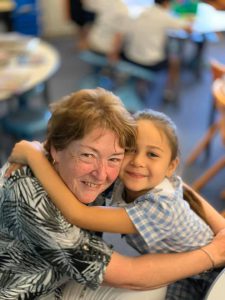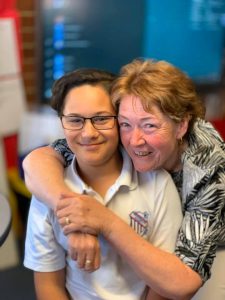The Australian Council of State School Organisations, or ACSSO, is one of Australia’s longest operating peak bodies for education. Formed in 1947, ACSSO represents the families of more than 2.4 million children in government schools around the country.
While traditionally focused on primary and secondary school aged children, in the past 18 months ACSSO has intensified its advocacy for education in children’s early years. It’s a welcome additional voice for the ECE sector. ACSSO is not only respected by governments, it also reinforces the role of families in supporting universal access to quality early education for every child.
Recently ACSSO was invited to speak to the Universal Access to Early Childhood Education Review and presented its support for two years of preschool education for every Australian child.
CELA spoke with ACSSO’s CEO, Dianne Giblin AM, about this shared interest in early childhood education.
Who does ACSSO represent?
We’re a voice for families and communities in public schools across the nation. Families and school communities trust us to share that voice with governments – particularly the Australian Government. We also provide the international voice for Australian families in overseas forums.
 ACSSO CEO Dianne Giblin and one of her children at Grandparent’s Day
ACSSO CEO Dianne Giblin and one of her children at Grandparent’s Day
With a traditional focus on school aged children, what has brought ACSSO’s interest to the early childhood education sector?
There’s a growing awareness of the importance of those early years. For ACSSO, we’ve been swayed especially by the newer research on brain development and on reports showing the long-term economic impact of quality education prior to school. The Lifting Our Game report was very interesting for us, and so was the more recent report from The Front Project on economic benefits.
We can also see that the early years can be a foundation for something very dear to us: partnerships between parents and educators.
What do you think parents need to know about in ECE?
For a parent, I think it’s vital to know that quality early years education creates a partnership with them as the child’s first and forever teacher. If they get that partnership with their child’s educators in daycare or preschool, they should reasonably expect to have it when their children go to school, too.
…we are helping parents understand how quality early education builds an essential foundation for their child’s life.
As the voice of parents, we are the experts regarding our children and when we need help, we bring in the professionals. We take our children to doctors, to swimming coaches, to dance classes, to driving instructors …we need to be clear that this is the role we have for educators too. We are the child’s first and ongoing teacher, but we know they need more.
Many parents have been trained to think of ECE as a safe place to leave their kids while they work, and that’s been government’s attitude to funding too, from what we can see. We believe that has to change and so we are helping parents understand how quality early education builds an essential foundation for their child’s life. What happens in those early years can leave lasting imprints on the child which may in turn affect how they learn and behave throughout life.
What do school staff need to know more about in ECE?
Probably foremost would be to understand the value of play-based learning and to perhaps learn more about the foundations that quality ECE gives children before they start school. We’d like to see genuine play-based learning happening in the first year or two of school education around Australia – we don’t think it’s the same as being given a stencil as a reward for finishing your spelling early (that’s just busy work)!
Another big challenge for schools is to get kindergarten transitions right, and that simply can’t happen without better respect for early childhood education and family engagement. The individual focus on children in ECE is wonderful and, sure, you don’t have the same ratios of teacher:child in schools, but there is still so much more schools could include from a child and family’s preschool experience into the transition to school.
…we don’t think [play-based learning at school is] the same as being given a stencil as a reward for finishing your spelling early (that’s just busy work)!
We’d like to see school transitions run less like fast food drive-through and more like a restaurant where you sit down and work with the staff to choose the aspects of starting school that will work best for each child. Parents need a seat at that table – not just in rows of little chairs listening to the head lice lecture, or how to find the uniform shop. And early years education input must be a bigger part of that discussion too. Good schools listen to parent and child expectations – and they also hear what knowledge the early childhood educators have to impart.
What do Federal and State politicians need to know more about in ECE?
It almost goes without saying for your readers that there needs to be a much greater investment in early childhood education in Australia. We strongly believe, on the basis of evidence, that every Australian child must have access to two years of quality preschool education. That is the way for all children to build the foundations they need to successfully participate in school and in life, and it’s absolutely critical for those children who come from any family that is facing additional challenges – like financial, language, unemployment, illness.
We made it mandatory, and funded the decision, for 17 year olds to be in some kind of education or training and it’s no different … to extend funding at the early learning stage.
It’s a very clear economic decision and it’s hard to understand why governments have taken so long to get even this close to confirming and extending Universal Access to two years of preschool.
 On that note, the other thing government needs to know is that these year-to-year funding extensions are intolerable and inefficient. Universal Access to two years of preschool (or at the very least, one) has to be embedded permanently in education policy as part of our national commitment to lifelong learning. We made it mandatory, and funded the decision, for 17 year olds to be in some kind of education or training and it’s no different as a policy decision to extend funding at the early learning stage.
On that note, the other thing government needs to know is that these year-to-year funding extensions are intolerable and inefficient. Universal Access to two years of preschool (or at the very least, one) has to be embedded permanently in education policy as part of our national commitment to lifelong learning. We made it mandatory, and funded the decision, for 17 year olds to be in some kind of education or training and it’s no different as a policy decision to extend funding at the early learning stage.
ACSSO has a long history of advocating for meaningful family engagement practices in schools. How does that interest connect with ECE?
We want to study this more, but our feeling at this stage is that ECE ‘does’ family engagement better than schools do and that there are translatable lessons from the early years to the school years.
Principals tend to think they invite us parents into their schools. In reality, we are inviting them into our children’s lives.
As a discipline, family engagement in education has been around for 50 years or so. Family engagement is often seen in our schools as a synonym for ‘parent volunteers’ but that’s not how we view it at all. Real family engagement can transform a school community and change children’s lives for the better. It’s about putting the needs of each child to the forefront and listening to parents as the child’s first and ongoing teacher. Principals tend to think they invite us parents into their schools. In reality, we are inviting them into our children’s lives. For a short but important part of our child’s learning journey we need schools and other professionals, like speech therapists, to support us help our child becomes the best they can be.
ACSSO is now creating an Early Childhood Reference Group for its state and territory members. Where is that up to and will there be opportunities for that group to connect directly with the ECE sector?
The ECRG is underway and a part of our commitment to supporting the early years as part of a continuum for learning for all children. We will use the group to examine policy, to look for advocacy opportunities, and to apply our strengths to the benefits of quality early childhood education in a child’s life.
We recently attended our first Early Childhood Australia conference as an exhibitor in Tasmania in September, and we will look for other ways to communicate with and support the ECE sector. The evidence is so compelling: early education is vital and must be properly funded and supported for every family in Australia.